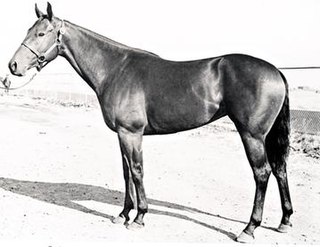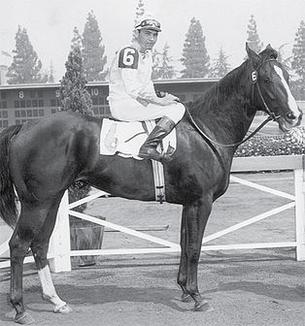
Thoroughbred horse racing is a spectator sport in Australia, and gambling on horse races is a very popular pastime with A$14.3 billion wagered in 2009/10 with bookmakers and the Totalisator Agency Board (TAB). The two forms of Thoroughbred horseracing in Australia are flat racing, and races over fences or hurdles in Victoria and South Australia. Thoroughbred racing is the third most attended spectator sport in Australia, behind Australian rules football and rugby league, with almost two million admissions to 360 registered racecourses throughout Australia in 2009/10. Horseracing commenced soon after European settlement, and is now well-appointed with automatic totalizators, starting gates and photo finish cameras on nearly all Australian racecourses.

A Day at the Races is a 1937 American comedy film, and the seventh film starring the Marx Brothers, with Allan Jones, Maureen O'Sullivan and Margaret Dumont. Like their previous Metro-Goldwyn-Mayer feature A Night at the Opera, this film was a major hit.

Racing Stripes is a 2005 American sports comedy family film directed by Frederik Du Chau. The film was produced by Andrew A. Kosove, Broderick Johnson, Lloyd Phillips and Edward L. McDonnell, based on a script written by David Schmidt, Steven P. Wegner, Kirk DeMicco and Du Chau.

Let It Ride is a 1989 American comedy film. It was directed by Joe Pytka from a screenplay by Nancy Dowd based on the 1979 novel Good Vibes by Jay Cronley. It stars Richard Dreyfuss, David Johansen, Teri Garr, and Allen Garfield. The story is centered on a normally unsuccessful habitual gambler who experiences a day in which he wins every bet he places, and focuses on the personality contrasts and the perpetually upbeat, hopeful attitudes of losers.

Alysheba was an American Thoroughbred racehorse that won two legs of the Triple Crown in 1987. A successful sire, he produced 11 stakes winners.

Hangman's House is a 1928 romantic drama genre silent film set in County Wicklow, Ireland, directed by John Ford (uncredited) with inter-titles written by Malcolm Stuart Boylan. It is based on a novel by Brian Oswald Donn-Byrne. It was adapted by Philip Klein with scenarios by Marion Orth. The film is also notable for containing the first confirmed appearance by John Wayne in a John Ford film.

Sorrowful Jones, also known as Damon Runyon's Sorrowful Jones, is a 1949 American comedy-drama film directed by Sidney Lanfield. The film stars Lucille Ball and Bob Hope.
Riding High is a 1950 American black-and-white musical racetrack film featuring Bing Crosby and directed by Frank Capra. The songs were performed live during filming instead of the customary lip-synching to studio recordings. The film is a remake of an earlier Capra film with screenwriter Robert Riskin titled Broadway Bill (1934). While the film is generally a light musical comedy, its plot contains an unexpected tragic turn.

Barbara L (1947–1977) was an American Quarter Horse that raced during the early 1950s and often defeated some of the best racehorses of the time. She earned $32,836 on the race track in 81 starts and 21 wins, including six wins in stakes races. She set two track records during her racing career. After retiring from racing in 1955, she went on to become a broodmare and had 14 foals, including 11 who earned their Race Register of Merit with the American Quarter Horse Association (AQHA). Her offspring earned more than $200,000 in race money. She died in 1977 and was inducted into the AQHA's American Quarter Horse Hall of Fame in 2007.

Oh Doctor! is a 1917 American two-reel silent comedy film directed by and starring Roscoe "Fatty" Arbuckle and featuring Buster Keaton.

The Ex-Mrs. Bradford is a 1936 American comedy mystery film. William Powell and Jean Arthur star as a divorced couple who investigate a murder at a racetrack. This was the last film directed by Stephen Roberts before his death from a heart attack.
Three Men on a Horse is a 1936 American comedy film directed and produced by Mervyn LeRoy, adapted from the Broadway play of the same name written by George Abbott and John Cecil Holm. A mild-mannered greeting card poet has the uncanny ability to pick winners in horse races.

Miss Meyers was an American Quarter Horse racehorse and broodmare, the 1953 World Champion Quarter Running Horse. She won $28,725 as well as 17 races. As a broodmare, she produced, or was the mother of, the first American Quarter Horse Association (AQHA) Supreme Champion called Kid Meyers. She was the mother of three other foals, and was inducted into the AQHA Hall of Fame in 2009.

George Elsworth Smith was an American gambler and Thoroughbred horse racing enthusiast who became a multi-millionaire during the late nineteenth and early twentieth century. Smith was given the nickname "Pittsburgh Phil" in 1885 by Chicago gambler William "Silver Bill" Riley to differentiate him from the other Smiths that also frequented Riley's pool halls. Pittsburgh Phil is considered by many handicappers to have been an expert strategist, winning large sums of money at a time when racing statistic publications, such as The Daily Racing Form, were not widely available. At the time of his death from tuberculosis in 1905, he had amassed a fortune worth $3,250,000, which is comparable to $US 110,211,111 today. His racing Maxims, published posthumously in 1908, are considered to be the foundations of many modern handicapping strategies and formulas.
Glossary of North American horse racing:

Torchy Gets Her Man is a 1938 American comedy-drama film directed by William Beaudine and starring Glenda Farrell as Torchy Blane and Barton MacLane as Detective Steve McBride. It was released on November 12, 1938.
Horse racing in the United States dates back to 1665, which saw the establishment of the Newmarket course in Salisbury, New York, a section of what is now known as the Hempstead Plains of Long Island, New York. This first racing meet in North America was supervised by New York's colonial governor, Richard Nicolls. The area is now occupied by the present Nassau County, New York, region of Greater Westbury and East Garden City.

Condessa was an Irish Thoroughbred racehorse. In two seasons of racing she was highly tried, racing twenty-one times, winning five times and finishing second twice. As a two-year-old she won two minor races from eight attempts, but appeared to be well behind the best of her generation. In the following year she developed to become one of the best staying fillies of her generation in Europe, beating an exceptionally strong field in the Musidora Stakes at York Racecourse, finishing second in the Irish Oaks, and recording her biggest win at the same track when she won the Yorkshire Oaks. Her victories in 1981 were the first major successes for her trainer Jim Bolger. She was later transferred to the United States where she made no impact and was retired from racing at the end of the year. She has had some influence as a broodmare.

Betting on horse racing or horse betting commonly occurs at many horse races. Modern horse betting started in Great Britain in the early 1600s during the reign of King James I. Gamblers can stake money on the final placement of the horses taking part in a race. Gambling on horses is, however, prohibited at some racetracks. For example, because of a law passed in 1951, betting is illegal in Springdale Race Course, home of the nationally renowned Toronto-Dominion Bank Carolina Cup and Colonial Cup Steeplechase in Camden, South Carolina.

The 2021 Breeders' Cup World Championships is the 38th edition of the premier event of the North American thoroughbred horse racing year. The 14 races, all but one of which are Grade I, took place on November 5 and 6 at Del Mar Racetrack in Del Mar, California and were telecast by NBC and NBC Sports. The Breeders' Cup is generally regarded as the end of the North America racing season, although a few Grade I events take place in later November and December. The event typically determines champions in many of the Eclipse Award divisions.















